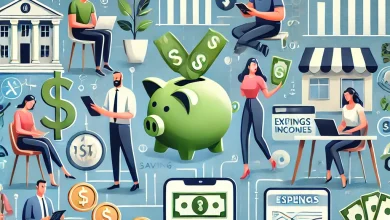The Future of FinTech: How AI and Blockchain Are Changing Finance
Introduction
The financial technology (FinTech) industry is experiencing a massive transformation due to advancements in Artificial Intelligence (AI) and Blockchain. These technologies are revolutionizing banking, investments, payments, and security, offering faster, safer, and more efficient financial services.
With AI-driven automation and blockchain’s decentralized transparency, traditional financial systems are evolving, giving rise to digital banking, cryptocurrency, smart contracts, and predictive financial analytics. In this article, we explore how AI and blockchain are reshaping finance and what the future holds for FinTech.
1. The Rise of AI in Financial Services
AI is redefining financial services by improving efficiency, reducing costs, and enhancing security. It is used in various areas, including:
✅ Automated Trading & Robo-Advisors – AI analyzes market trends and executes trades in real-time.
✅ Fraud Detection & Risk Management – Machine learning detects fraudulent transactions instantly.
✅ Chatbots & Virtual Assistants – AI-powered bots offer 24/7 customer support in banking.
✅ Personalized Financial Planning – AI suggests tailored investment strategies based on spending patterns.
A. AI-Powered Trading and Investments
AI-driven algorithms predict stock market trends by analyzing historical data, global news, and investor sentiment.
🔹 Example: Hedge funds like Bridgewater Associates use AI to make high-frequency trades with greater accuracy.
🔹 Benefits:
✔️ Minimizes human error in trading.
✔️ Enhances investment returns with data-driven insights.
✔️ Reduces risks by identifying patterns in market volatility.
B. AI in Fraud Detection and Cybersecurity
Financial institutions deploy AI-based fraud detection systems that monitor billions of transactions in real-time to detect suspicious activities.
🔹 Example: PayPal and Visa use AI-powered fraud detection to prevent unauthorized transactions.
🔹 How AI Improves Security:
✔️ Identifies unusual transaction patterns.
✔️ Reduces false fraud alerts and improves user experience.
✔️ Strengthens compliance with global banking regulations.
C. AI-Powered Chatbots and Virtual Assistants
AI-powered chatbots like Bank of America’s Erica and Capital One’s Eno assist users with account inquiries, bill payments, and financial planning.
🔹 How AI Chatbots Enhance Banking:
✔️ Provide instant financial advice and customer support.
✔️ Automate routine banking tasks (fund transfers, credit score analysis).
✔️ Improve user engagement with natural language processing (NLP).
2. The Role of Blockchain in the Future of Finance
Blockchain is a decentralized ledger technology that provides security, transparency, and efficiency in financial transactions. It is the foundation of cryptocurrencies like Bitcoin and Ethereum and has broader applications in finance.
A. The Rise of Decentralized Finance (DeFi)
DeFi platforms use blockchain to offer financial services without banks. Users can lend, borrow, and trade assets without intermediaries.
🔹 Examples of DeFi Applications:
✔️ Uniswap and PancakeSwap – Peer-to-peer crypto exchanges.
✔️ Aave and Compound – DeFi lending platforms offering interest on crypto deposits.
✔️ MakerDAO – A decentralized stablecoin project (DAI).
🔹 Benefits of DeFi:
✔️ Eliminates third-party fees (banks, brokers).
✔️ Enables financial access in underbanked regions.
✔️ Provides real-time transactions with smart contracts.
B. Blockchain-Powered Payments and Cross-Border Transactions
Traditional cross-border payments are slow and costly due to multiple intermediaries. Blockchain-based payment networks accelerate transactions with minimal fees.
🔹 Examples of Blockchain-Based Payment Systems:
✔️ Ripple (XRP): Enables instant, low-cost international payments.
✔️ Stellar (XLM): Connects banks and financial institutions globally.
✔️ CBDCs (Central Bank Digital Currencies): Governments are exploring blockchain-based digital currencies.
🔹 Advantages of Blockchain Payments:
✔️ Transactions settle within seconds.
✔️ Reduced transaction fees compared to SWIFT and PayPal.
✔️ Greater transparency and security in payments.
C. Smart Contracts: The Future of Automated Financial Agreements
Smart contracts are self-executing agreements that run on blockchain networks. They automate financial transactions, reducing the need for intermediaries like lawyers and brokers.
🔹 Example: Ethereum’s smart contracts enable automated lending, insurance, and real estate transactions.
🔹 How Smart Contracts Revolutionize Finance:
✔️ Eliminate third-party verification.
✔️ Reduce contract execution time and costs.
✔️ Increase transparency and trust.
3. The Future of AI and Blockchain in FinTech
🚀 AI-Driven Predictive Banking: AI will anticipate users’ financial needs, offering tailored investment opportunities.
🚀 Blockchain-Based Identity Verification: Banks will use blockchain for secure and tamper-proof digital identities.
🚀 Hybrid AI-Blockchain Systems: AI models will run on blockchain networks, enhancing financial security and efficiency.
🚀 Tokenized Assets & Digital Securities: Real-world assets (real estate, stocks) will be tokenized on blockchain networks.
4. Challenges of AI and Blockchain in Finance
A. Regulatory Uncertainty
Governments worldwide are still formulating regulations for cryptocurrencies, DeFi, and AI-driven finance.
B. Cybersecurity Risks
While AI and blockchain enhance security, cybercriminals continue to find vulnerabilities in new technologies.
C. Adoption Barriers
Many traditional banks and financial institutions are slow to integrate AI and blockchain due to infrastructure limitations.
Conclusion
AI and blockchain are redefining the future of finance, offering faster, smarter, and more secure financial solutions. From AI-driven trading and fraud detection to blockchain-powered payments and DeFi, these innovations are revolutionizing banking, investments, and global transactions.
As AI becomes more sophisticated and blockchain gains wider adoption, FinTech will continue to evolve, making financial services more efficient, transparent, and accessible for everyone.
💡 Stay updated with the latest FinTech innovations by following Tech Financial Idea! 🚀



